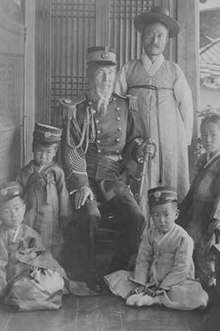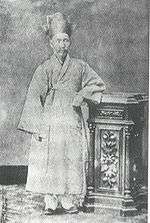Yun Ung-nyeol
General Yun Ung-nyeol or Yun Woong Niel[1] (also known as Yun Ung-ryeol (윤웅렬, 1840-1911), was Joseon Dynasty and Korean Empire's soldier and politician. a member of Party Gaehwa(개화당;開化黨).
| Yun Ung-nyeol | |
.jpg) Yun Ung-nyeol (left) and a friend attired in traditional Korean clothing. The two are engaged in a game of "Go-ban" (oriental chess) in one of the rooms of Yun's home in Seoul c. 1903. | |
| Korean name | |
|---|---|
| Hangul | 윤웅렬 |
| Hanja | |
| Revised Romanization | Yun Ung-nyeol |
| McCune–Reischauer | Yun Ungnyŏl |
| Pen name | |
| Hangul | 반계 |
| Hanja | |
| Revised Romanization | Bangye |
| McCune–Reischauer | Pangye |
| Courtesy name | |
| Hangul | 영중 |
| Hanja | |
| Revised Romanization | Yeongjoong |
| McCune–Reischauer | Youngjung |

a Pro-Japanese scholar-bureaucrat of Joseon Dynasty and the Korean Empire in the late 19th century and the early 20th century. a penname was Bangye(반계, 磻溪).
Biography

Yun Ung-nyeol was a member of one of the prominent yangban families of Korea. His family was considered wealthy.[2] but he was illegitimate child of his father. In 1857, Yun passed the military examination(무과; 武科).
he was long times Movementing of member Party Gaehwa with Kim Ok-gyun and Hong Yeongsik.
In 1904, Yun Ung-nyeol was the Korea's Minister of War.[3] 1911 died, aged 71.
In modern Korean historiography, General Yun has been designated one of the Chinilpa or pro-Japanese activists of the 1900s (decade).[4]
See also
- Gapshun Coup
- Yun Chi-ho
- Yun Bo-seon
- Kim Ok-gyun
- Hong Yeong-sik
- Philip Jaisohn
Notes
- Emory University, Manuscript, Archives, and Rare Book Library (MARBL): Yun Ch'i-ho papers, 1883-1943
- "100 Koreans Freed; But Baron Yun Chi-ho and Other Prominent Men Are Found Guilty," New York Times. March 21, 1913.
- Speer, Robert E. (1905). "Korea, Japan and Russia," p. 60.
- (in Korean) 2006년도 조사보고서 II - 친일반민족행위결정이유서, p. 257~262 친일반민족행위진상규명위원회, 11-1560010-0000002-10, 2006; n.b., investigative report II - pro-Japanese anti-national act decisive reasons, p. 257~262 pro-Japanese anti-national act truth close examination committees.
References
- Kranewitter, Rudolf. (2005). Dynamik der Religion Schamanismus, Konfuzianismus, Buddhismus und Christentum in der Geschichte Koreas von der steinzeitlichen Besiedlung des Landes bis zum Ende des 20. Jahrhunderts. Münster: LIT Verlag. ISBN 978-3-825-88628-8; OCLC 181472594
- Leibo, Steven A. (2006). East and Southeast Asia. Harpers Ferry, West Virginia: Stryker-Post Publications. OCLC 61691567
- Speer, Robert E. (1905). "Korea, Japan and Russia," in The Ideal Home Educator: a Superb Library of Useful Knowledge. Chicago: Bible House. OCLC 17303311
- Wells, Kenneth M. (1991). New God, New nation: Protestants and Self-Reconstruction Nationalism in Korea, 1896-1937. Honolulu: University of Hawaii Press. ISBN 9780824813383; OCLC 216760168